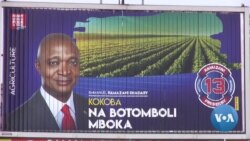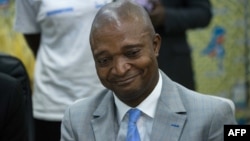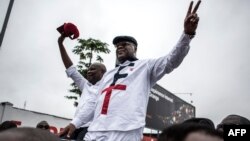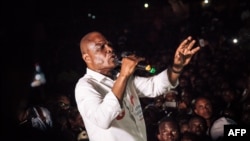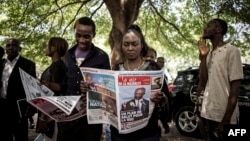After two decades under the Kabila family, voters in the Democratic Republic of Congo face what appears to be a simple choice as they go to the polls Dec. 23: Continuity, or change?
Longtime President Joseph Kabila is stepping down two years after his mandate expired. His departure from the top job has opened the door to a flood of 21 presidential aspirants.
But for Congo-watchers, both inside and outside this vast country, it’s not that simple.
Congo, after all, is a nation the size of Western Europe, heaving with natural resources and arable land, but with the infrastructure of a much smaller country.
Is the poll a show?
Even in the capital, Kinshasa, power and water outages are common; roads are degraded to the point where some are puddles of mud. Many critics of Kabila’s regime, accused repeatedly of corruption, worry this poll is just a show.
“The big question is whether Kabila is preparing for a peaceful transfer of power to Shadary, one of his loyalists, and ensuring that he does not inherit a catastrophic situation, similar to that which [he] inherited when he seized power after his father’s mysterious assassination,” wrote analyst Michael Khorommbiin South African media. “Or is it just for his political ambitions to maintain control; to protect his financial assets and secure immunity from prosecution for any crimes committed while in office for the past 17 years?”
In this crowd of presidential hopefuls, only a handful of names stand out. Little-known former interior minister Emmanuel Ramazani Shadary is Kabila’s choice to become Congo’s next president, and he is campaigning heavily on that relationship.
“I was chosen as candidate for the presidential election by President Joseph Kabila,” he told a crowd recently at a campaign rally, speaking in Swahili.
Shadary faces stiff competition from a fractured, but passionate opposition, including from the son of the late longtime opposition leader.
Felix Tshisekedi, who is widely seen as the frontrunner, entered the race late, after the opposition chose another man as their coalition candidate.
That coalition candidate, businessman Martin Fayulu, told VOA he’s confident that voters will back him. But an October opinion poll conducted by international and local research groups only gave him about 8 percent of the vote.
“We want to leave after us all the bad things that Mr. Kabila has done in this country,” Fayulu told VOA. “The bad things that the 20 years of Kabilisme have done in this country. Corruption, insecurity, the mass killing, that should be something that we have to make a big cause, so we can move ahead and change things in this country.”
But he says he’s not sure this election will give him that chance. On this point, the divided opposition sings in the same key: they believe this poll will not be free, fair or transparent.
An area of particular concern is the electronic voting machines that opposition figures have repeatedly described as “rigging machines.” Adding to that, the government has refused any foreign assistance to hold this poll, saying they’ll do it all themselves, without foreign interference.
Fayulu, who says he will refuse to use a voting machine and will insist on a paper ballot, says the elections have been a mess from the start.
“The elections, you know, the organization is the worst organization,” he said. “I’ve never seen a country organizing elections and doing what is being done here in this county. Starting from the electoral register. It was a disaster.”
Shadary’s camp disputes these claims and says they are confident the poll will be up to standard.
Andre-Alain Atundu, a spokesman for the ruling coalition and a close associate of Shadary’s, says he thinks continuity is important, and that it will happen, no matter who wins.
“If it’s Mr. Shadary, he’s saying, I’ll continue with the spirit of progress advanced by Mr. Kabila,’” he told VOA. “He’s honest. The others will take advantage of what Mr. Kabila has left. ... It’s a question of honesty. And every next president will want to continue what Mr. Kabila has had the opportunity to achieve.”
As the poll nears, election paraphernalia is everywhere in the capital, with Shadary’s impassive face beaming from billboards and promising economic development, security and better infrastructure.
Tshisekedi and Fayulu are far less visible on posters, but Kinshasa is an opposition stronghold, where their rallies are packed and where historically they have performed well.
The visual clutter of faces and names and promises has almost become invisible to residents of the bustling capital, who declined to stop and talk about politics when asked.
But as Dec. 23 edges closer, everyone is wondering: In which direction will Congo go?




